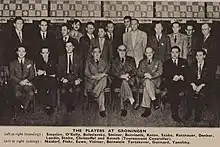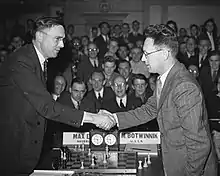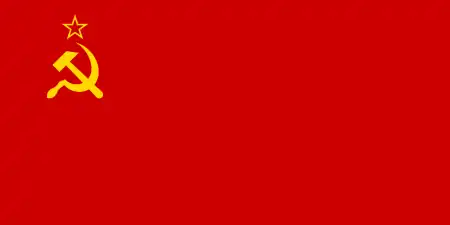Groningen 1946 chess tournament
Groningen 1946 was the first major international chess tournament to be held after World War II.[1] Held at Groningen in August and September 1946, it was considered a miracle that the Netherlands could stage such an event just fifteen months after the end of the war.
Summary

Mikhail Botvinnik won the tournament a half point ahead of former World Champion Max Euwe. It was Botvinnik's first outright victory outside of the Soviet Union and Euwe's last major success.[2]


Groningen was the first tournament outside the Soviet Union to which the Soviets sent a team of masters to compete. The Soviet players were very successful, Botvinnik taking first, Vasily Smyslov third, and Isaac Boleslavsky and Salo Flohr tied for sixth and seventh, beginning an era of Soviet domination of international chess.[3]
The tournament was a twenty-player round-robin. Although the field was strong, some top players were not present. From the United States Samuel Reshevsky and Reuben Fine were missing. From the Soviet Union Paul Keres was missing, as Soviet authorities would not let him play outside the country during this period.[4]
Botvinnik and Euwe quickly jumped ahead of the field, making it a two-person contest for first place. At the halfway point (after round 10), Botvinnik had 9 points, Euwe 7½, and Smyslov and Arnold Denker 7. After round 13, Botvinnik had 11½, Euwe 10½, and Smyslov and László Szabó 8½. In round 14, Euwe beat Ossip Bernstein, who at age 65 was the oldest player in the tournament. Botvinnik lost to his countryman Alexander Kotov, creating a first place tie with Euwe. Years later, Kotov reported that he received considerable criticism for beating Botvinnik at a critical point in a major tournament. (Botvinnik was favored at the time by the Soviet chess establishment as a challenger for the world chess championship.) Kotov would make up for his imprudence in the final round. In round 15 Euwe pulled ahead by a game by defeating Milan Vidmar, while Botvinnik lost a second consecutive game, this time to Daniel Yanofsky. With four rounds remaining, the scores stood Euwe 12½, Botvinnik 11½, Smyslov 10½, and Szabó 9½. Euwe's one point lead was not safe as he drew his next three games (Gösta Stoltz, Flohr, and Savielly Tartakower) while Botvinnik won three (Čeněk Kottnauer, Martin Christoffel, and Carlos Guimard) to pull ahead by half a point. In the final round, both Botvinnik and Euwe were playing black and both had strong opponents. The positions of the leaders did not change as both Botvinnik and Euwe lost. Botvinnik was outplayed by Miguel Najdorf, but Euwe blundered to lose in an even position against Kotov to leave Botvinnik with first place.[4]
Crosstable
Groningen 1946[4] Player 01 02 03 04 05 06 07 08 09 10 11 12 13 14 15 16 17 18 19 20 Total Place 01  Mikhail Botvinnik (USSR)
Mikhail Botvinnik (USSR)* ½ 1 0 1 1 ½ 1 1 ½ 0 1 1 0 1 1 1 1 1 1 14½ 1 02  Max Euwe (NED)
Max Euwe (NED)½ * 0 ½ 1 1 ½ ½ ½ 1 0 ½ 1 1 1 1 1 1 1 1 14 2 03  Vasily Smyslov (USSR)
Vasily Smyslov (USSR)0 1 * ½ ½ 1 ½ ½ ½ ½ ½ ½ 1 ½ ½ ½ 1 1 1 1 12½ 3 04  Miguel Najdorf (ARG)
Miguel Najdorf (ARG)1 ½ ½ * 1 1 ½ 0 ½ ½ ½ ½ 0 1 ½ ½ ½ 1 1 1 11½ 4–5 05 .svg.png.webp) László Szabó (HUN)
László Szabó (HUN)0 0 ½ 0 * 1 ½ 0 1 0 1 ½ 1 1 ½ 1 ½ 1 1 1 11½ 4–5 06  Isaac Boleslavsky (USSR)
Isaac Boleslavsky (USSR)0 0 0 0 0 * ½ 1 1 1 1 1 ½ ½ ½ ½ ½ 1 1 1 11 6–7 07  Salo Flohr (USSR)
Salo Flohr (USSR)½ ½ ½ ½ ½ ½ * ½ ½ ½ 0 ½ ½ 1 ½ 1 ½ ½ 1 1 11 6–7 08  Erik Lundin (SWE)
Erik Lundin (SWE)0 ½ ½ 1 1 0 ½ * ½ 0 ½ 1 0 1 0 ½ ½ 1 1 1 10½ 8–9 09  Gösta Stoltz (SWE)
Gösta Stoltz (SWE)0 ½ ½ ½ 0 0 ½ ½ * 1 ½ ½ 1 ½ 1 1 0 ½ 1 1 10½ 8–9 10  Arnold Denker (USA)
Arnold Denker (USA)½ 0 ½ ½ 1 0 ½ 1 0 * 0 ½ 0 ½ 1 ½ ½ 1 1 ½ 9½ 10 11  Alexander Kotov (USSR)
Alexander Kotov (USSR)1 1 ½ ½ 0 0 1 ½ ½ 1 * ½ 0 ½ 0 1 ½ 0 1 0 9½ 10 12  Savielly Tartakower (FRA)
Savielly Tartakower (FRA)0 ½ ½ ½ ½ 0 ½ 0 ½ ½ ½ * 1 ½ ½ 1 1 ½ ½ ½ 9½ 10 13  Čeněk Kottnauer (CSK)
Čeněk Kottnauer (CSK)0 0 0 1 0 ½ ½ 1 0 1 1 0 * 1 1 0 ½ ½ 0 1 9 13 14 .svg.png.webp) Daniel Yanofsky (CAN)
Daniel Yanofsky (CAN)1 0 ½ 0 0 ½ 0 0 ½ ½ ½ ½ 0 * ½ 1 1 1 ½ ½ 8½ 14 15  Ossip Bernstein (FRA)
Ossip Bernstein (FRA)0 0 ½ ½ ½ ½ ½ 1 0 0 1 ½ 0 ½ * ½ ½ ½ 0 0 7 15-16 16  Carlos Guimard (ARG)
Carlos Guimard (ARG)0 0 ½ ½ 0 ½ 0 ½ 0 ½ 0 0 1 0 ½ * 1 ½ ½ 1 7 15-16 17 .svg.png.webp) Milan Vidmar (YUG)
Milan Vidmar (YUG)0 0 0 ½ ½ ½ ½ ½ 1 ½ ½ 0 ½ 0 ½ 0 * ½ ½ 0 6½ 17 18  Herman Steiner (USA)
Herman Steiner (USA)0 0 0 0 0 0 ½ 0 ½ 0 1 ½ ½ 0 ½ ½ ½ * 1 ½ 6 18 19 .svg.png.webp) Albéric O'Kelly de Galway (BEL)
Albéric O'Kelly de Galway (BEL)0 0 0 ½ 0 0 0 0 0 0 0 ½ 1 ½ 1 ½ ½ 0 * 1 5½ 19 20 .svg.png.webp) Martin Christoffel (SUI)
Martin Christoffel (SUI)0 0 0 0 0 0 0 0 0 ½ 1 ½ 0 ½ 1 0 1 ½ 0 * 5 20
Publications
- Max Euwe & Hans Kmoch: Groningen 1946. Het Staunton Wereldschaaktoernooi. Groningen, Niemeijer, 1947
References
- The USA–USSR 1945 Radio Match preceded it, although only two nations participated and the players did not meet in one location.
- Brace, Edward R. (1977), An Illustrated Dictionary of Chess, Hamlyn Publishing Group, p. 123, ISBN 1-55521-394-4
- Hartston, William (1977), "Groningen 1946", in Golombek, Harry (ed.), Golombek's Encyclopedia of Chess, Crown Publishing, p. 133, ISBN 0-517-53146-1
- Pachman, Luděk (1987) [First published 1975], Decisive Games in Chess History, Dover, pp. 118–124, ISBN 0-486-25323-6